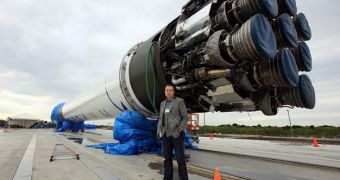Officials at Hawthorne, California-based Space Exploration Technologies (SpaceX) announce that the first launch of their new, medium-lift delivery system will take place no early than June 2. Over the past few weeks, the launch date for the Falcon 9 rocket has been slipping continuously, even though the company is under contract with NASA to conduct its first flight test by next month. The rocket has been sitting at its special launch pad at the Cape Canaveral Air Force Station (CCAFS) in Florida for months, Space reports.
The maiden flight was scheduled to take place tomorrow, May 28, but company officials came out and said that they were targeting a new date, next month. One of the main reasons for the delay is the fact that the US Air Force (USAF) has yet to give its seal of approval for SpaceX's flight termination system. This component is to ensure that the rocket is fully destroyed in mid-air, if something is to malfunction soon after launch. Such measures are destined to prevent the security of structures and people at the CCAFS, and of those living nearby. As soon as this approval is obtained, the company can proceed with launching the rocket. All preliminary tests, including those of the nine Merlin engines powering the first stage, are complete, and results are encouraging.
“Looks like the delay of the [Air Force Delta 4] GPS satellite launch has taken up a lot of resources at the Cape and in turn pushed the first test launch of Falcon 9 from May 28/29 to no earlier than June 2/3,” told reporters in an email Emily Shanklin, who is a spokeswoman for SpaceX. All launches at the CCAFS are dependent on the spaceport's flight manifest, which can suffer modifications independent of the companies or government agencies seeking to launch various missions to space. For example, the USAF failed to launch its latest GPS satellite because of weather and technical issues. As soon as those are solved, the Delta 4 rocket carrying the spacecraft will take off, followed by Falcon 9.
Additional delays were caused by the return of space shuttle Atlantis on May 26, after completing a 12-day trek to the International Space Station. The USAF is scheduled to make another launch attempt today, May 27. If successful, then SpaceX could expect to receive a launch permission for June 2/3. However, if delays occur again, the launch data could slip even further. This maiden flight is very important for both the company and NASA, because the American space agency plans to retire its shuttles later this year. This means that the job of ferrying supplies, and potentially astronauts, to the ISS will lie with companies such as SpaceX, and Virginia-based Orbital Sciences Corporation.

 14 DAY TRIAL //
14 DAY TRIAL //